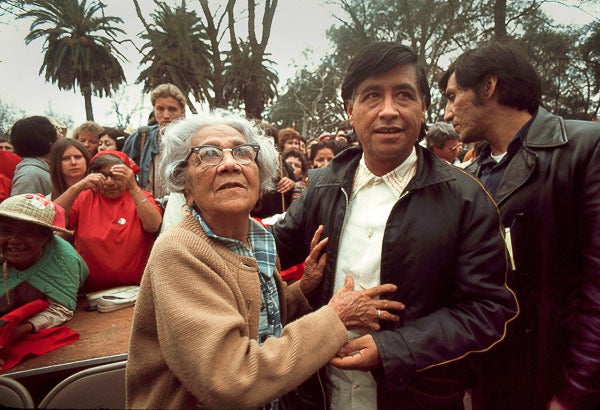|
April 1, 2014
New Stanford photo archive highlights turbulent times of civil rights movement
The new Bob Fitch Photography Archive at Stanford Libraries brings to life historical events and intimate moments from the peace, social justice and cultural movements of the 1960s and 1970s. By Gabrielle Karampelas

Cesar Chavez and his mother, Juana Estrada, appear at a rally in Modesto, Calif., in 1973. (Bob Fitch Photography Archive, Stanford Libraries)
Civil rights activist Cesar Chavez is one of the subjects featured in Stanford Libraries' new Bob Fitch Photography Archive, a collection of images shining a spotlight on critical moments in recent American history.
About 200 images from the Fitch archive are now online and available in the Stanford Libraries' catalog SearchWorks, including photos of Chavez and Martin Luther King Jr.
Overall, the complete archive includes about 200,000 images. They will be processed in phases, and about 10,000 of them will eventually be made available and preserved in the Stanford Digital Repository. The images and their metadata will be available for research, discovery and teaching purposes at Stanford.
An exhibition, "Movements for Change: the Bob Fitch Photography Archive at Stanford," will open Sept. 14 in the Peterson Gallery of the Green Library.
Fitch, now living in Watsonville, Calif., worked as a photojournalist for the Southern Christian Leadership Conference in the 1960s and has been active in many civil rights and social justice movements.
Beyond the Chavez gallery, the Fitch archive gives an up-close-and-personal look at the various peace and social justice movements and leaders in the 1960s and 1970s – including Martin Luther King Jr., activist-journalist Dorothy Day, politician Ron Dellums and folk singer Joan Baez.
The gallery on Cesar Chavez and the United Farm Workers is the first installment of select images to be digitized and made available by Stanford Libraries. It includes 90 images, ranging from photos of Chavez sitting alone in his office to others of him with his mother and at funerals of slain UFW workers.
Stanford history Professor Albert Camarillo, an expert on Mexican American history, described the new archive as a "golden, unprecedented opportunity" for researchers, instructors in the classroom and students.
Roberto Trujillo, the head of special collections at Stanford Libraries and co-curator of the archive, said that Fitch documented the organizing efforts of Chavez for seven years, capturing images of workers, their families and their organizing struggles as well as Chavez's travels.
"Some of the photographs are intimate and offer a glimpse behind the headlines of their time," Trujillo said.
Fitch's Chavez/UFW photographs will expand Stanford Libraries' Mexican American collections, the largest of its kind in the United States.
Stanford's Benjamin Lee Stone, curator of American and British history and co-curator of the Fitch Archive, said that Fitch provided coverage for African America press outlets when the risks were too high to send their own journalists to various events in the South. One of his photos of Martin Luther King Jr. served as the basis for the Martin Luther King Jr. Memorial in Washington, D.C.
Stone pointed to a photo of Coretta Scott King with Dolores Huerta, co-founder of UFW, as an illustration of the personal alliances of that period. "Fitch's powerful photographs show these interconnections in striking ways," Stone said.
As Camarillo said, "There's nothing quite like the depth and scope of the Fitch photo archive anywhere."
For more Stanford experts on history and other topics, visit Stanford Experts.
-30-
|